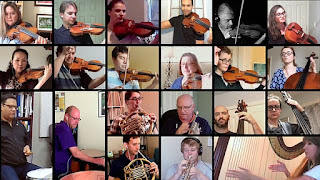By Emmanuel Dorado
What is Live Music?
Live Music has been around for many centuries and is a form of entertainment for the public audience. It brings people together to watch and listen to musicians perform music in a live venue or stage. Compared to pre-recorded music, live music is a completely different experience because you are there in person with the musicians performing the art raw and live. It connects the audience more with the musicians and the music itself.
Unfortunately, due to the COVID-19 pandemic taking place, live music has been put to a halt since large gatherings are now restricted. This means that live musical performances are no longer able to happen and this impacts working musicians and the music industry itself.
Statistical Impact
Stephan Hall, the author of "This is how COVID-19 is affecting the music industry", states "The music industry has been hit hard by coronavirus with live performance revenue the biggest casualty. A six-month shutdown is estimated to cost the industry more than $10bn in sponsorships, with longer delays being even more devastating."
A statistic from Pollstar showed that the global concert business had lost $9.7 billion in just ticket sales alone along with sponsorships, merchandise, concessions, and other factors that cost them another $30 billion (Blisten and Millman).
How musicians have been affected by it
Many musicians and artists have been heavily impacted by the pandemic due to the loss of income and their jobs as well. Blisten and Millman state "Ever since Covid-19 brought concerts and tours to a crashing halt this spring, the global live music industry has been in a bind: It was one of the earliest industries forced to shut down, and it will likely be one of the last to reopen. In the meantime, promoters and booking agents have lost jobs, venues have shuttered, artists have been cut off from one of their most reliable streams of income, and thousands of tour crew members have faced a financial and existential reckoning."
Performing musicians rely mainly on freelance music work and that income has been lost due to the restrictions of the pandemic. There is not any security of recovering any money that had been lost with the cancelation of venues and performances and that is something that artists making a living on. The "gig" workers do not have any retirement plans, paid vacations, paid salaries, or any job security for pursuing the entertainment industry. The musicians and their crew members are not really able to work from home and make a living during this quarantine (Waxman).
Alternate forms of performing "Live Music"
The solution has been that many companies such as Twitch, Facebook, and Instagram have begun to hold virtual musical performances that are live-streamed and fans are able to interact with them. The way they are able to monetize this is by using artist subscriptions that allow early or exclusive access to virtual performances and gatherings, including commenting. This would many musicians earn an income and can also help kickstart virtual music careers for uprising musicians. (Hall)
As a musician and educator myself, this has affected me greatly as well. Live performances and in-person music education have been a majority of our income as musicians, but that has been taken away from us due to the COVID-19 pandemic. We went from performing and teaching music in-person to stay at home and not being able to interact with one another anymore. Many of us have lost jobs and so much income that we have been forced to find different careers and not do what we love as our job. We are not meant to be apart from each other and isolated. Musicians are meant to create and perform live music together in person along with live audiences.
Sources:
Blistein, Jon, and Ethan Millman. “When Will Live Music Return?” Rolling Stone, Rolling Stone, 22 Dec. 2020.
Hall, Stephan. “This Is How COVID-19 Is Affecting the Music Industry.” World Economic Forum.
Waxman, Gideon. “The True Impact Of COVID-19 On The Music Industry.” L4LM, 20 Mar. 2020.





No comments:
Post a Comment